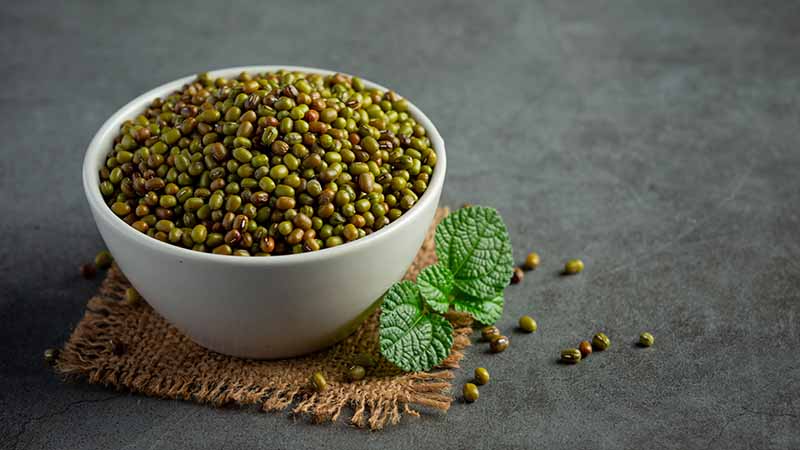Should Sprouts Be Eaten Raw Or Cooked? What's The Right Way?
- 37 months ago
Sprouts are a popular form of protein among vegan health enthusiasts. However, whether sprouts should be eaten raw or cooked has always been a burning debate among vegans. And today, we’re going to end this debate once and for all.
This blog will talk about what sprouts are, their health benefits, and nutritional value of different types of sprouts. And, by the end, you’ll be able to decide whether you should consume sprouts raw or cooked. So, read in full.
What are Sprouts?
Sprouts are simply the seeds that have germinated into young plants. The germination process starts when you soak the seeds into water overnight or for a few days (depending on the type of seed) in the favorable temperature and moisture. And the result is a 2-5 cm long sprout emerging from the seed.
There are several types of seeds that can be sprouted, such as:
● Pea and Bean Sprouts: Such as mung bean, adzuki, lentil, black bean, kidney bean, soybean, Moth beans (dew beans), black chana, etc.
● Sprouted Grains: Such as buckwheat, brown rice, amaranth, quinoa, Kamut, etc.
● Seed and Nut Sprouts: Such as pumpkin seed, alfalfa seed, almond, etc.
● Leafy Sprouts: Such as beet, broccoli, radish, fenugreek, etc.
However, the most common types of sprouts are alfalfa, mung Mung beans, moth beans (dew beans), black chana, wheatgrass, red clover, and radish.
What are the Benefits of Consuming Sprouts?
1. Highly Nutritious
Sprouted seeds are more nutritious than unsprouted or fully grown plants. It’s because the sprouting process increases the content of Vitamin C, K, folate, protein, manganese, and phosphorus. Also, sprouting increases the number of essential amino acids in the seed, which also increases the nutritious value.
2. May Help Control Blood Sugar
A study shows that sprouts help regulate amylase activity which the body uses for breaking and digesting sugars. Also, a study in people suffering from diabetes showed that regular consumption of sprouts might help reduce blood sugar levels to some extent.
3. May Improve Digestion
Sprouts may help you enhance digestion. It’s because the fiber content in the seed increases by sprouting. For instance, a study showed that a grain that was allowed to sprout for five days contained about 133% more fiber than unsprouted grains.
4. May Improve Heart Health
Sprouts can help improve your heart health in several ways. One way is by lowering bad cholesterol and improving good cholesterol.
What is the Nutritional Value of Different Sprouts?
Here is the nutritional value of common types of sprouts:
|
Nutrients |
Mung bean sprouts |
Alfalfa sprouts |
Broccoli, mustard, and clovers and sprouts |
|
Carbohydrates |
6g |
0.7g |
2g |
|
Calories |
31 |
8 |
20 |
|
Protein |
3g |
1.3g |
2g |
|
Sugars |
4.3g |
0.1g |
0 |
|
Fiber |
1.9g |
0.6g |
2g |
Should Sprouts be Eaten Raw or Cooked?
To find a precise answer to this question, we must consider both methods.
Raw Sprouts
Sprouts are usually grown under humid conditions or soaking the seed in water. And these conditions are favorable for bacterial growth. It’s the reason raw sprouts aren’t recommended for children, pregnant women, and elderly people.
There are several ways of consuming raw sprouts, such as adding them to sandwiches or salads. Some people even consume them as they are(raw).
Always make sure to wash the sprouts before consuming them raw. This will help remove the bacteria that might have been attached to the seeds. However, you should know one thing, that no matter how hard you wash, it’s not enough to remove or rinse all the bacteria. And this is the reason consuming raw sprouts leads to food poisoning.
Furthermore, raw sprouts/plants are hard to digest for some people. After all, this is the reason why we’re always told to cook the food properly.
Boiled/Cooked Sprouts
One great way of eating sprouts is by boiling them at 160-degree Fahrenheit. Boiling/heating/cooking at this temperature usually helps kill all the bacteria and increases the bioavailability of nutrients and nutrients are more accessible to the body. You can cook sprouts by using them in soups, stews, stir-fries, or any other way you find viable. Other than boiling, other ways to cook sprouts could be steaming or pressure cooking. This way, you can prevent the risk of any bacterial infections.
However, you should know that cooking for longer period of time or boiling sprouts kills some nutrients along with the bacteria. But losing some nutrition is way better than picking a bacterial infection and then regretting it, right?
You must try: Mixed sprouts cutlet|Healthy recipe
To the Burning Question: Cooked or Raw?
While some people complain of stomach aches, nausea, etc., most don’t feel anything after consuming raw sprouts. So, you can try sprouts raw, and if it suits you, you can go ahead. However, if you feel that raw sprouts are upsetting your stomach, it’s better to cook them thoroughly.
Takeaway
Raw sprouted seeds usually contain bacteria which should be avoided by the elderly, kids, pregnant women, and immunocompromised individuals. It’s because bacteria can cause serious infections. Although it may lose some nutritious value, sprouts are considered more safe post-cooking. So, choose wisely.









